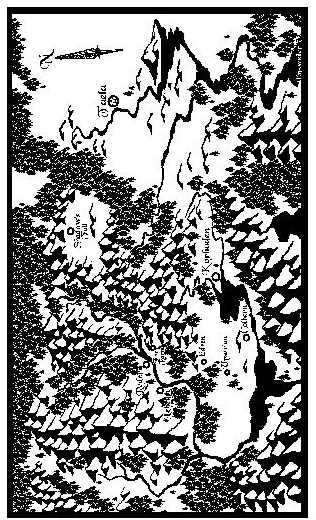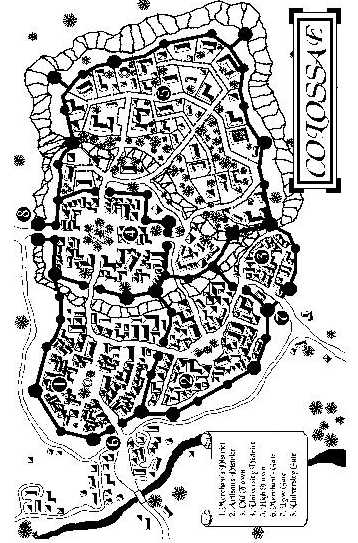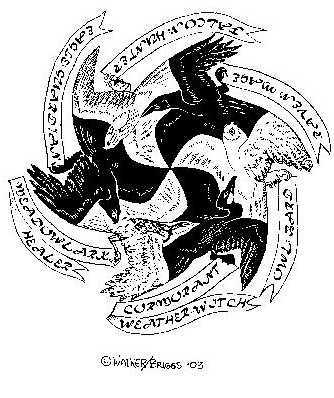Raven's Strike
Authors: Patricia Briggs


Patricia Briggs

This is a work of fiction. Names, characters, places, and incidents are either the product of the author's imagination or are used fictitiously, and any resemblance to actual persons, living or dead, business establishments, events or locales is entirely coincidental.
Â
Raven's Strike
Â
An
Ace
Book / published by arrangement with the author
Â
All rights reserved.
Copyright ©
2005
by
Patricia Briggs
This book may not be reproduced in whole or part, by mimeograph or any other means, without permission. Making or distributing electronic copies of this book constitutes copyright infringement and could subject the infringer to criminal and civil liability.
For information address:
The Berkley Publishing Group, a division of Penguin Putnam Inc.,
375 Hudson Street, New York, New York 10014.
Â
The Penguin Putnam Inc. World Wide Web site address is
http://www.penguinputnam.com
Â
ISBN: 1-101-13392-9
Â
AN
ACE
BOOK®
Ace
Books first published by The Ace Publishing Group, a member of Penguin Putnam Inc.,
375 Hudson Street, New York, New York 10014.
ACE
and the “
A
” design are trademarks belonging to Penguin Putnam Inc.
Ace Books by Patricia Briggs
MASQUES
STEAL THE DRAGON
WHEN DEMONS WALK
THE HOB'S BARGAIN
DRAGON BONES
DRAGON BLOOD
RAVEN'S SHADOW
RAVEN'S STRIKE
For evenings of song and laughter,
Debbie and Tom Lentz, and Theo Hill Jason, Sara, Jalen, and Chris Stejskal
John and Sue Wilson
And to my own Bard
Michael
This book is dedicated with love.
AcknowledgmentsThe following people read this book, or parts of this book in its roughest stages and offered useful and necessary advice.
Michael Briggs, Collin Briggs, Dee Enzweiler, Michael Enzweiler, Jean Matteucci, Dan Matteucci, Ann Peters, Kaye Roberson, Kyle Roberson, Clyde Rowland, and John Wilson.
I'd also like to thank Robin Walker, for her wonderful artwork, and Michael Enzweiler, who provided the map of Colossae that Rinnie found.



ROLOGUE
In the eighth year of the Reign of Phoran, Twenty-Sixth of that name, the Sept of Leheigh died.
His son, Avar, long having lived in Taela as a boon comrade of the young Emperor, traveled to the estate the Sept, his father, had bequeathed him. Hidden among those who traveled with the new Sept were a handful of mages who came for secret purposes.
They left one of their number, a mage-priest, to establish a new religion in the heart of Leheigh, a land old in power and well suited to secretsâthis they thought the most important of their twofold assignment.
The second was to steal away a man gifted with the Bardic Order of the Owl, just returning to his family from a winter's hunt. The familiar task was no more difficult than many other such abductions they had accomplishedâperhaps easier, for the Orders of Mage and Hunter were, either of them, more suited to resist the attack of wizards than the Order of the Bard.
They had no reason to suppose that this man was any different from the scores of such men and woman they had stolen in the past. No more did Iâand I should have known, for Tieragan of Redern was no stranger to me.
The thought of his eventual death, needful though it was, saddened me. That his death meant anything to me at all told me that I had put it off almost too long. I would miss listening to him sing, I thought on the day I sent my wizards out to take him. I took some consolation from the knowledge that even if he had lived, I would not have been able to listen to him for much longer: he or his kin would have noticed what I was.
If I could not listen to his songs, it was fitting that soon no one would hear Tier's music. So I told myself, and put his death out of my head. I had forgotten, though, what he had been and had only remembered the farmer who sometimes earned a few extra coins by singing at the Hero's Welcome in the evenings.
So I left Tier to my wizards, who had always served me well, and concerned myself with the growth of my religion.
It had taken almost a full century before I realized that I could use power gained from things other than death. Death is what I crave, but I am chary of using it more than necessary. It draws too much attention, and the power that it brings is too addictive. It makes me reckless, when I want to be subtle. Instead I've learned to feed on strong emotions: envy, hate, and lust.
My temples are an endless supply of such emotions. What do people pray to their gods for, after all?
Let my father die so that I might inherit his wealth,
says one, while another bows his head and asks,
Let Toren's wife look upon me with lust
. Some prayers are more desperate.
Please, let no one find out that I stole my lord's gold. I don't want to die
. I fed upon those desires, even as the gods must once have. They made me strong.
I am not the Unnamed King. They sometimes treat him as though he was the only Shadowed. But he was not the first Shadowed, nor, as, I can attest, was he the last. Unlike him, I do not need the adulation and the name of power when I have the reality of it. I don't want to be Emperor of the world. I have other plans. It suits me to allow others to accomplish my purposes. It amuses me.
I pride myself on knowing which men will serve my needs best. I grew dependentâno, not dependentâ
complacent
. I grew too complacent because my people always
obey me, always accomplish the tasks I set them to.
If I'd been paying closer attention to the wizard-priest Volis, I would have seen that his ambition was going to interfere with my own plans. I could have stopped the destruction of my temple in Redern.
But that temple was a convenience, not a necessity. It was formed as much to keep the ambitious and powerful wizard Volis where he could do little harm as for any other purpose. Thousands fed me from my temples in Taela. I did not need Redern, and so did not guard it as well as I might have. My neglect allowed Tier's wife to destroy it. My fault, true. But on the whole, I consider Volis's death to be as great a benefit to me as the temple was a loss. He was getting too ambitious, too curious. He knew too much.
The destruction of the Secret Path in Taela, though, was a much greater loss, but I am not at fault there. No one could have expected that Tier, who was not even a
Mage,
could destroy in a matter of months what had taken me centuries to build. No one.
It took the whole of humanity, wizards and warriors, to bring down the Unnamed King. I, who will become so much more than He was, will not have it said that I was brought to my knees by a
farmer
.
I burn with the humiliation of it yet.
I could have defeated themâa ragtag band of Travelers and a Sept's personal army would have been no match for the power I wield. But it would have been the first step in a war that I do not want. What good is it to rule the world when there is no world to rule? That is a question that the Unnamed King should have asked himself. But, I suppose by then he had already burned away most of who he once was and become nothing but an outlet for the Stalker's power. I have a better plan.
I can repair the damage. Rebuild the temple, rebuild my Secret Path. The destruction was not as great as it would seem: there are always ambitious men who will serve me. Tier has caused me no permanent setback; he is not so important.
But he must be punished for what he has done, what his family has done. He will wish he were dead before I am through with him. Perhaps I shall grant his wish.
HAPTER
1

“Get that bucket filled for me, Lorra. Tole, bring more charcoal.”
Aliven knew his voice was harsh, but the world was a harsh place, with no room for people who did not work.
He watched out of the corner of his eye as his daughter snatched the wooden bucket from its place near the forge and left the smithy at a brisk walk for the well.
He would lose her soon, he thought, as he sorted through his store of metal. He'd two offers for her hand from neighboring farmers, but she hadn't made up her mind yet. He hoped she chose Daneel, who was soft-spoken and old enough to have proved his mettle, but she'd been showing a preference for Sovernt's youngest.
He would be happy to see her settled with either, though it would leave him only Tole and Nona, neither of whom was big enough to carry the bucket full of water or half a dozen other chores required to keep the smithy running.
“Step up, Tole,” he said to his son, who had only half filled the forge coal bed. “The morning won't wait on your dawdling.”
“Yes, Da,” muttered the boy in a tone just this side of insolence.
“You watch yourâ”
Lorra's shrill scream cut through his voice.
“It doesn't look like much of a village, Papa,” said Lehr.
Tier smiled at his youngest son, who had somehow crossed over from boy to man these past few months. His ash-blond hair, a legacy of his mother's people, was mostly tucked under a hat, but anyone with an eye to see could tell that there was Traveler blood in him.
Lehr's long strides had no trouble keeping up with Skew, though Tier's old warhorse was walking briskly. Tier shifted in his saddle, hoping to alleviate the steady ache in his right knee. He might believe the adage that any wound that hurt was a sign he wasn't dead yet, but that didn't mean he had to enjoy it. He took a deep breath of cool forest air to remind himself that he was free and on his way home: a little pain was a small price to pay.
He squinted at the small cluster of buildings in the little green valley. “It's small, but see that first building? There's a kiln behind it. It's either a pottery or a bakery.”
“But, Papa,” said Tier's older son Jes, who walked on Tier's other side, “Benroln said we need grain, not pots or bread.”
“Very true,” agreed Tier. “But so near to a great road, they will have trade goods, too.”
“There are farms all around here,” explained Lehr. “They'll bring grain here where they'll see higher profits from it than if they had to transport it to a bigger market.”
Jes gave a puzzled frown. It might have been that he found Lehr's explanation too complexâor something else had distracted him.
It was ironic that Jes, who looked as Rederni as any village son, would be the one to pay the highest price for his mother's Traveler blood. The lesser part of that price was the slow thoughts and slower speech that set him apart as a simpletonâthough he wasn't, quite.
“It doesn't look right,” said Jes after a moment.
“What doesn't?” asked Tier. Jes's conversations sometimes were as difficult to follow as a hummingbird's flight.
“The buildings.” Jes stopped abruptly and stared ahead.
Tier stopped Skew and tried to see what might have attracted Jes's attention.
“There's no smoke from the smithy,” said Lehr.
“That's it,” said Jes, nodding with his usual exaggerated motion. “Smithies have smoke.”
“Maybe the smith isn't working today,” Tier said. “We'll be there soon enough.” Urging Skew forward, he squeezed a little too enthusiastically with his legs and couldn't bite back a yelp.
Shadow take these knees, the wizards who broke them, and the Traveler healer who can't fix them any faster.
That last wasn't fair, and he knew it. Brewydd had told him that riding Skew rather than one of the carts was making his knees take longer to heal than necessary. But it was bad enough to have to ride while most everyone else proceeded by their shoe leatherâhe was
not
going to sit in a cart.
“Are you all right?” asked Jes, his hand hovering just over Tier's leg. “Mother told me to watch out for you.”
“Just my knees.” Tier gave his son a smile despite the way his right knee was throbbing. “They're taking a long time to heal upâI must be getting old.”
“Mother says you push too hard,” said Jes frowning. Obviously Tier's smile hadn't been as convincing as he'd intended.
They had all taken to fussing over him, which Tier found both touching and annoying. He'd rather nurse his hurts in private if he could.
“Brewydd says that your mother is fretting too much,” replied Tier.
“And Mother says to leave healing to the Lark,” added Lehr, though he was looking concerned as well. “Brewydd knows what she's doing.”
Jes frowned.
“I'm all right,” Tier said again.
Lehr, he could have just told to leave it alone, but once Jes got something on his mind he could be amazingly stubborn. So Tier caught Jes's dark eyes with his own, and said firmly, “Even your mother agreed that I was fit for a visit to a village to negotiate for suppliesâthat's what we Bards are supposed to do. We owe this Traveler clan more than we can repay, but I can get them good prices on the things they need and ensure
that they'll have a welcome here next time they pass through. My knees still bother me, and will for a month or two more, but they are a fair bit on their way to normal.” It helped that he told the truth. Jes would hear it in his voice.
“I don't like those wizards,” said Jes, and for a moment there was something dark, something alien in his voice.
“Nor I,” agreed Tier, having no trouble making the connection between his knees and the wizards who'd caused them to be broken, because he'd just been thinking the same thing. “But they are gone for good and can do no more harm to anyone.”
“We rescued you,” said Jes in sudden satisfaction. “And you will be fine, and we are going home. Rinnie will be happy to see us. I wouldn't have wanted to stay with Aunt Alinath.”
“Your aunt's a good person,” admonished Tier. His sister was uncomfortable around Jes's oddities, and because of that, she mishandled his oldest. Nevertheless, she was his sister, and he loved her.
Jes set his chin stubbornly. “She is bossy and rude.”
“Like Mother,” said Lehr, with the quick sunny smile that he used all too seldom.
“Mother is Raven,” said Jes, as if that explained and excused those faults, which, Tier thought, was largely correct. “And she is only rude to fools.”
Lehr laughed. “And that's most of the people she meets.”
Tier shook his head. “She's not usually rude, just intimidating.”
“If you say so,” said Lehr. “Weren't we going to negotiate with someone to buy some grain? Or are we going to stand here all day gossiping like old women?”
Jes grinned shyly and ducked his head. “Papa will negotiate, and you and I can watch. I like watching.”
“Right. Just mind you don't say anything about Travelers unless Papa does.”
Tier urged Skew forward again, this time with his weight and a click of his tongue. The patchwork-colored gelding paced forward with his usual glass-smooth walk.
There were three huts, the smithy, a small pottery, and a handful of small buildings in the village that Benroln had sent them to. But there was no answer from inside the potter's shed
when Lehr knocked, nor did anyone come out at his shout. He opened the door and briefly peered inside.
“No one here.”
So they went to the next building.
The smithy was a three-walled, open-face shed and appeared as empty as the pottery had been. Tier threw a leg over Skew's back and slidâslowly for the sake of his stiff kneesâto the ground. He dropped the gelding's reins to ground-tie him and limped into the building, Lehr and Jes beside him.
Inside the smithy, tools were hung in an organized manner on one wall, rough steel lay scattered on the ground next to the forge, as if someone had just dropped it there. Tier put a hand over the bed of coals, then touched them cautiously, but not even the memory of fire lingered.
“What can you tell me about this, Lehr?” asked Tier. “How long have they been gone?”
It was an unreasonable question to ask of even the most seasoned tracker. The roof of the smithy kept the rain off and the walls protected the dirt floor. Tier wouldn't have been able to tell how long the steel had lain on the ground, abandoned to tend to whatever emergency had called the smith away.
But Lehr, like Jes and Tier himself, was an Order Bearerâand his Order was Falconâthe Hunter.
Lehr cast his Falcon's eyes over the scene and Tier felt the rise of magic as his son read the traces left by the people who'd lived here.
“No one's been in this building for at least two days, maybe as long as three,” he said finally. “But there were chickens here until yesterday.”
They'd seen no chickens when they rode up.
“There are people here still,” said Jes after a moment, his voice crisp and alert. “I can smell them.”
Something about the deserted place had alarmed his oldest son. Jes, his sweet-natured slow-speaking Jes, was gone as if he had never been, and in his place was the deadly predator who sometimes looked out of Jes's eyes. Jes's Order was a heavier burden than the others. Jes was Guardian, and the magic-induced dread that accompanied his secondary nature, unique to the Eagle's Order, sent chills up Tier's spine.
Lehr didn't even look up from the ground just outside the smithy. “Something ate the chickens.”
“What kind of something?” asked Tier.
“I don't know,” Lehr answered. “It's not very bigâabout the weight of a small wolf. See, here's a print.”
Tier peered at the faint trace in the dust of the small trail. To his eyes it could have been any of a number of animals. “Could it be a raccoon?”
Lehr shook his head. “It's not a raccoon. No racoon has claws that size.”
“Can you see where the people went?”
“There's someone here, Da,” Tole said, his face pressed against a crack in the wall. “Out by the smithy. Strangers this time.”
Aliven looked up from the damp cloth he was using on his wife's forehead. She hadn't opened her eyes since he'd brought her here days ago.
Because their home was closer to the well than the smithy was, his wife had been quicker to answer their daughter's scream. By the time he'd gotten to the well, Lorra was dead and his wife was struggling beneath some dark beast. When the strange creature noticed Aliven it ran off; at first he'd thought that the sound of his shout or the sight of his hammer had sent it fleeingâbut he'd since learned the folly of that. Perhaps it only hadn't want to kill its food too fast lest it spoil. In any case, between the time he'd carried Irna into the house and returned for Lorra, it had come back and dragged her body away.
He'd sent his son for Tally, his wife's cousin, who'd been so immersed in his potting that he'd not heard Lorra's scream. As the other man had come hurrying over, it had attacked yet again, from behind the garden hut. If Aliven hadn't been carrying his hammer still, the beast would have gotten them both instead of just clawing up Tally's face.
He'd never seen anything move as fast as the beast did. Aliven had gotten Tally and the two children into their hut and barred the windows and doors. So far the beast hadn't torn through the wooden walls, but the smith was pretty certain the
thin walls wouldn't keep it out when it finally decided it wanted in.
It had, after all, herded him back into the hut as neatly as a well-trained sheepdog putting lambs into their fold. Yesterday, a couple of farmers had come to pick up the plowshare he'd fixed for them. Aliven had left the hut to warn them, but he'd been too late. He'd found them both, dead, behind the potter's shed.
The beast had let him stay there a while. But when he'd gotten to his feet, it had pushed him back to the hut with unseen growls and noises. It wanted them there until it was hungry again.
Both Irna and Tally were dying. The initial wounds had been bad enough, but infection had set in with frightening speed. Irna hadn't moved for a day and a half, and Tally had been unconscious since daybreak.
Trapped inside the confines of the little hut, Aliven'd had to make do with what they had, andâhe carefully wet the cloth againâhe was running out of water.
Maybe these new people Tole was watching would be able to help. The Sept sent men out on patrols, soldiers who might know how to deal with the beast.
“Who is out there?” he asked his son.
“A dark man with a little grey in his hair, tall like Daneel. He's limping pretty badly. They've a horseâit's spotted like a cow, Da. There are two other men with him, younger. They look like they're all close kin. Can they help us?” Tole looked up with hope in his eyes; Aliven hadn't told either of his children about the two dead farmers.